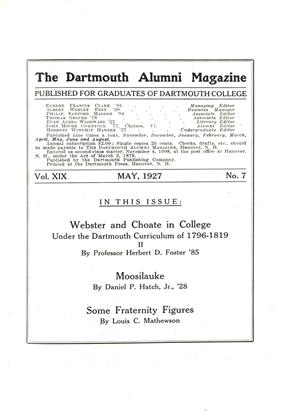(From The Springfield (Mass.) Union)
It is as a lover of football, as one who delights in the game and who has interestedly watched its general trends for the last twenty-five years and more (who as graduate manager of athletics has learned what goes on behind the scenes, that President Ernest M. Hopkins of Dartmouth College makes the provocative suggestions set forth elsewhere in this issue. No one sees more clearly than he that it is gradually becoming a question of modifying collegiate football in important particulars or abolishing it entirely.
Lovers of the game who wish to see it preserved under some scheme recognizably like the present one should not underestimate the influence of those who urge that football be unceremoniously dropped from college athletics. It is easy enough to say that nothing of any consequence will be done about football, but the very fact that so clear-headed and conservative an educator as President Hopkins thinks radical changes necessary suggests that a great deal may be done about it. Officials of half a dozen of the larger universities, many of whom are alarmed at present conditions, have only to say the word to knock a good deal of the bottom out of collegiate football. Unless far-reaching reforms are instituted within the next few years they may no longer hesitate to say it.
To abolish college football would not be to kill the game, of course. It has grown too popular to be easily killed. But it might result in building up and permanently diverting the attention of the public to professional teams. It is because he believes that football, carefully restricted, has a place in college that President Hopkins makes his suggestions. The three main proposals of his letter to Lemuel M. Hodgkins, president of the Dartmouth Alumni Council, are, first, that only sophomores and juniors be eligible to play on varsity football teams, that the varsity squad be divided into two teams, one to play at home, the other away from home, and that all coaching be done by undergraduates.
These suggestions, and his reasons for them, are fully set forth in his letter to Mr. Hodgkins. It is unlikely that they will escape attack and objection. President Hopkins' suggestion of two varsity teams, for example, may not be feasible, and to many certainly will not be attractive. But they will stir up discussion, which is greatly to be desired, and out of it may come a scheme which will retain many of the advantages of present conditions while removing many of the disadvantages. If football is to stay as a sport of our major universities it must be relegated to a less disproportionate place therein.
 View Full Issue
View Full Issue
More From This Issue
-
 Article
ArticleWEBSTER AND CHOATE IN COLLEGE
May 1927 By Herbert Darling Foster '85 -
 Article
ArticleTHE UNDERGRADUATE CHAIR
May 1927 -
 Article
ArticleMOOSILAUKE
May 1927 By Daniel P. Hatch, Jr. '28 -
 Article
ArticleSOME FRATERNITY FIGURES
May 1927 By Louis C. Mathewson -
 Article
ArticleDARTMOUTH STUDENTS SAID TO BE IRRELIGIOUS
May 1927 -
 Class Notes
Class NotesClass of 1921
May 1927 By Herrick Brown







